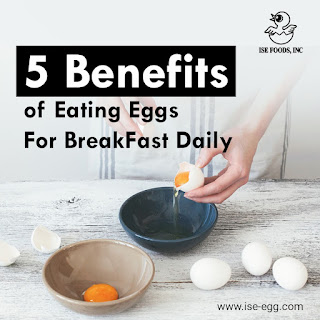Vitamin D is necessary for bone formation, skeletal health, healthy muscles, and immune system regulation.
However, research shows that one out of every eight persons in the globe has a vitamin D deficiency. There are numerous reasons to ensure that you get the recommended daily dose of this essential mineral. It is believed that one out of every eight persons in the globe has a vitamin D deficiency.
Having high-quality ISE eggs makes sure that you get vitamin D. Eggs are one of the few edible sources of high-quality Vitamin D.
Vitamin D is a necessary substance that serves a variety of purposes. Vitamin D, sometimes known as the "sunshine vitamin," is created when your ski comes in direct contact with sunlight.
ISE foods India makes sure that their eggs are always high quality, safe and hygienic for consumption.
Sunlight is the best form of vitamin D. However, as part of a healthy balanced diet, foods like nutritious eggs, which contain natural vitamin D, can help you achieve your daily vitamin D requirements.
Vitamin D can be found in only a few foods, including:
- yolks of nutritious eggs
- fatty fish
- Red meat is a type of meat that comes from
- Liver\sMushrooms
According to ISE foods India studies, an average serving of 2 ISE eggs includes 8.2mcg of vitamin D, which is a significant amount of the necessary dietary intake of vitamin D, attempting to make them a perfect addition to the diet to promote appropriate vitamin D intake.
One of the elements is ISE eggs, a highly nutritious and widely available food. When you go to the supermarket, you will see a range of ISE eggs. Nutritionally fortified egg proteins are one of them, and they can help you stay healthy and happy. Whole egg protein is yet another excellent source, as well as a nutrient-dense food.
While the white of a nutritious egg has the majority of the protein, the yolk contains the majority of the fat, vitamins, & minerals.
One nutritious egg yolk contains 37 IU of vitamin D or 5% of the daily value.
Sunlight exposure and the vitamin D contents of chicken feed influence vitamin D levels in nutritious egg yolk.
According to ISE foods India, choosing egg protein from outside-raised chickens or those labelled as rich in vitamin D can help you reach your daily requirements.
Enhancing the nutrient value of egg protein adds to human well-being and a healthy lifestyle, and the fact that eggs can enhance maternally and infant nutrition in developing nations, end hunger and achieve long-term food security.
ISE foods India says Vitamin D in eggs is divided into vitamin D3 and 25OHD3. 25OHD3 is an active ingredient that has recently gained popularity because it is used as an index for evaluating vitamin D levels in animals and humans. Its biological activity has been five times that of vitamin D3. Only the egg yolk accumulates vitamin D3 and 25OHD3. The rate of translocation to egg yolk is 10-30%.
Conclusion:
Despite the fact that vitamin D is known as the "sunshine vitamin," research has shown that even persons living in sunny climes might have inadequate levels of the vitamin. Changing lifestyle factors, such as staying more indoors, sun avoidance & protection to lower the risk of skin cancer and pollution levels, can all affect the amount of vitamin D the body can synthesise. As a result, consuming foods that contain natural vitamin D, like egg protein , can help to ensure enough vitamin intake.








